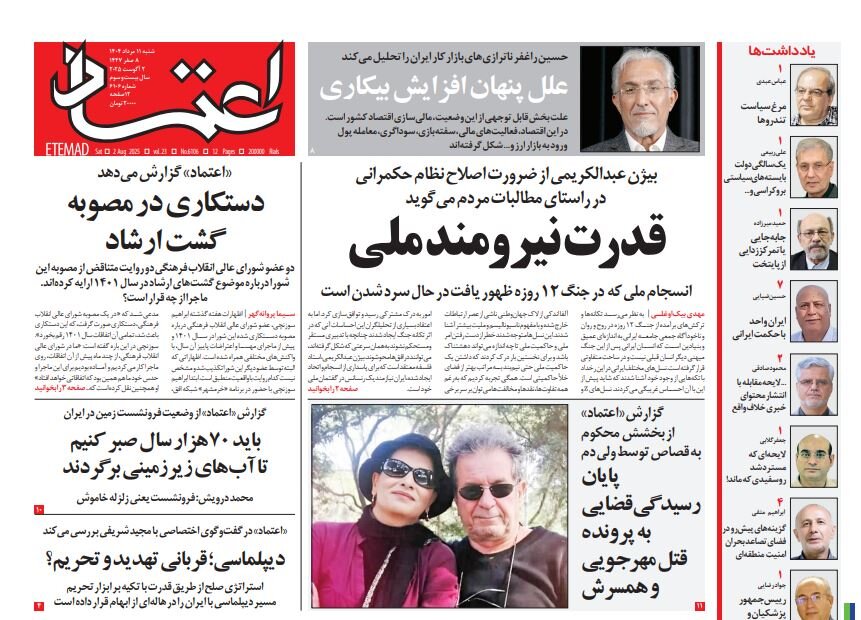Zangezur Corridor is a tool for geopolitical limitation

TEHRAN - In an analysis, Etemad examined the proposed Zangezur Corridor project, highlighting its geopolitical implications.
According to reports in Armenian media, Turkey has been seeking access to the so-called Zangezur Corridor for nearly a century. While the Armenian government frames the initiative as a means to unlock economic benefits, the project lacks genuine commercial or economic justification. Its primary function appears to be geopolitical rather than economic. The corridor would reshape the regional order, enabling Turkey and Azerbaijan to assert leadership in the South Caucasus. This shift could marginalize Russia’s influence and significantly curtail Iran’s strategic presence along its northern borders. For Iran, the consequences could be profound: a disruption in the geopolitical balance, expanded Turkish influence, potential U.S. presence near its borders, and the severing of direct access to Armenia, Georgia, and the Black Sea. Moreover, Iran could become reliant on a transit route through Azerbaijan—one increasingly influenced by Israel—while its role in China’s Belt and Road Initiative may be diminished. If control of the corridor is handed over to Baku, Tehran risks losing its leverage over northern trade routes, not only with the South Caucasus, but also with Russia and Europe.
Ressalat: National power in face of Israel’s imposed war on Iran
In an article, Ressalat highlighted national unity following Israel’s 12-day war against Iran. It wrote: Today, the Islamic Republic is at the peak of its military, political, cultural, social, intelligence, and security power thanks to the resilience of the Iranian nation. This power was unveiled in the imposed war of the United States and the Zionist regime that used all NATO’s combat, intelligence, and security capabilities against the Iranian nation. The world today finds itself facing a superpower called Iran, a superpower that has been able to hit Israel’s and the United States’ vital places with missiles and drones. The Iranian "national power" was able to humiliate the Zionist occupation regime and make it face the ruins in the cities of Haifa and Tel Aviv. What is clear is that the two components of "religion and knowledge" are the driving force of this national power. The West does not want a civilization based on religion and knowledge. Therefore, it believes that the only way to confront the Iranian nation is to attack religious scholars and scientists. A system grounded in both religious principles and scholarly insight exemplifies the strength and effectiveness of Velayat-e Faqih—the rule of the Supreme Jurisprudent—in guiding societal governance. This deeply rooted internal structure is resilient and cannot be easily undermined by either domestic or foreign forces.
Farhikhtegan: Best time to quit JCPOA was after Trump's withdrawal
Mohammad Esmaeili, an expert in international law, tells Farhikhtegan that when Donald Trump withdrew from the JCPOA in May 2018, it was the best time for Iran to do so. He said: The best time Iran could have minimized the consequences of the JCPOA was the day Trump withdrew from the JCPOA. Iran should have withdrawn that day. Now we must proceed with caution. Currently, suspending activities with the IAEA is better than withdrawing, because any decision can bring about military dimensions for the Iranian society. Now, deciding to suspend cooperation with the NPT is good, but we can turn this suspension into withdrawal after examining security, political, and defense considerations. Excessive dialogue with the United States also benefits Europe, because Europe wants to be the center of developments related to Iran's nuclear activity. But we must pay attention to the fact that withdrawing from the JCPOA is not bad, but it cannot be a positive obstacle to prevent the activation of the snapback mechanism. The diplomatic apparatus must make the right diplomatic decisions and they must be careful in this regard.
Hamshahri: Why has the West become radical again?
In a commentary, Hamshahri addressed the renewed threat of a military attack on Iran by Trump and Israel. It wrote: Over the past week, the leaders of the Zionist regime and the U.S. have once again intensified their rhetoric towards the Islamic Republic of Iran and spoken of the possibility of a renewed military attack on Iran. These radical positions seem meaningful, especially as Western governments are increasing pressure on Tel Aviv to facilitate humanitarian aid to the people of Gaza and made a promise to recognize the Palestinian state soon under certain conditions. And since the Zionist regime is currently not in a good state due to the urgent demand from the global public to end the famine in the Gaza Strip, the regime is trying to relieve itself from the pressure by renewing the threat of possibility of another aggression against Iran. The next goal is to unsettle public opinion in Iran and prevent the situation from becoming normal in our country. In other words, the Zionists and Americans, with their cyber mercenaries, are trying to put the Iranian nation in a state of “struggle for survival” and not allow issues such as development and progress to find a place in our national prospect as Iranians.
Leave a Comment